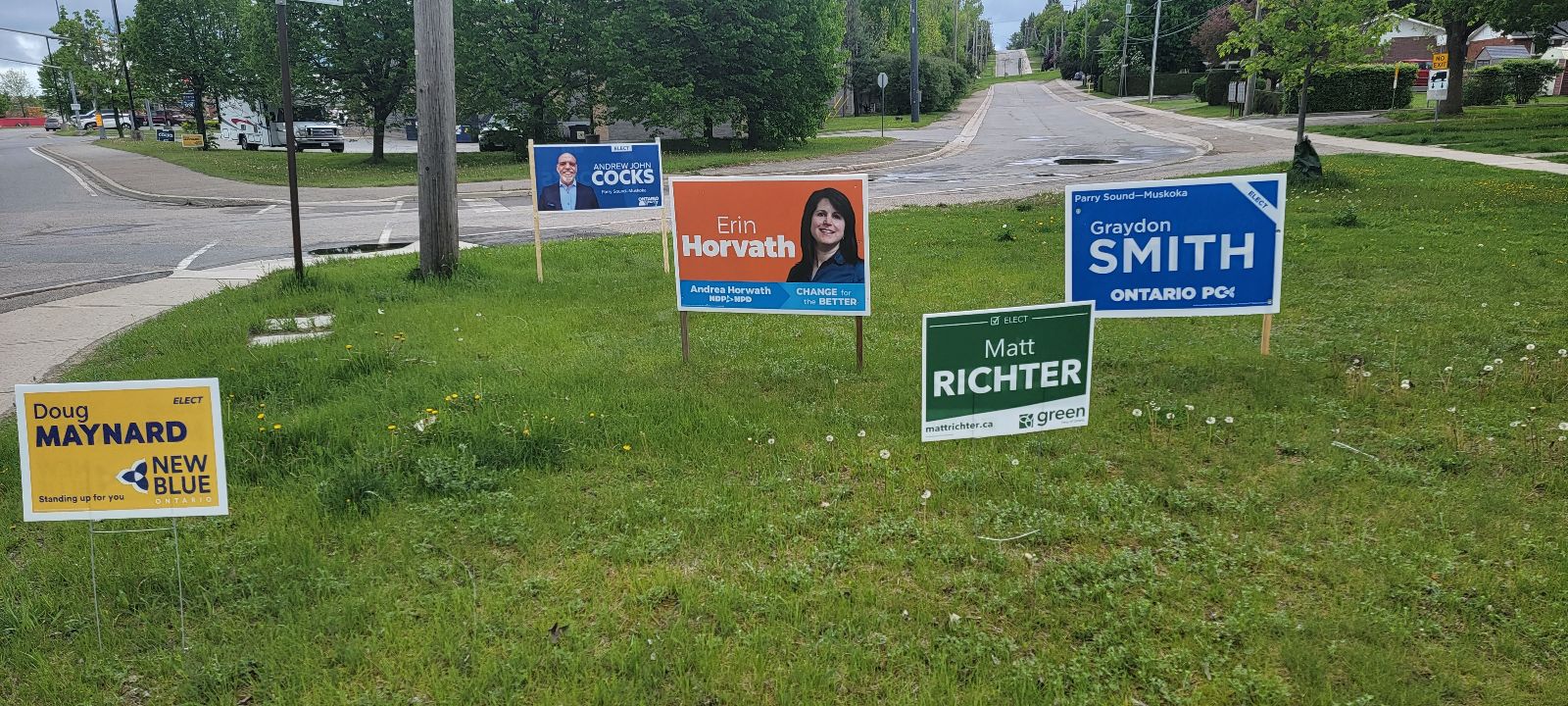The MyMuskokaNow.com newsroom reached out to all the candidates that will be on our riding’s ballot for the June 2 provincial election to get their thoughts on the issues that matter in Parry Sound-Muskoka.
Each week leading up to election day, we will publish a story with each candidate answering a question that residents have as they head to the polls.
This week we asked them about the environment: “reports say our hospitals have been dealing with staffing issues and a constant overflow of patients. As our riding, hospitals, and long-term care homes continue to deal with pandemic-related pressures, what can we look forward to seeing in terms of relief to the health care system if you’re elected?”
Graydon Smith, Progressive Conservative Party of Ontario
Smith says after years of inaction by previous governments, Doug Ford and the PCs are “getting it done.”
Smith says as the mayor of Bracebridge for over a decade, he’s been at the forefront of the conversation to get more funding for the South Muskoka Memorial Hospital in Bracebridge and the Huntsville District Memorial Hospital. “We’ve seen a real rebound under Doug Ford and the PCs getting that healthcare system back in shape,” he says.
As part of that, Smith says that “billions” are being invested to create more hospital beds and recruit more workers, which includes recent funding that was announced in April for Bracebridge and Huntsville hospitals.
Erin Horvath, Ontario’s New Democratic Party
NDP candidate Erin Horvath says hospital capacity has been a challenge pre-pandemic and continues to be one right now. She says this is a challenge because the last conservative government used hospital capacity to decide when to shut down the economy and schools, yet still refuses to invest in it up to the standard that other provinces are experiencing.
According to Horvath, the NDP believes that health care needs to remain public. She says the conservative government is ramping up the privatization of hospital services like labs, imaging and long-term care, all while underfunding the provincial system.
Horvath also says the current provincial government put in place Bill 124 that freezes the wages for healthcare workers at a 1 per cent increase per year even though inflation is at 6.7 per cent. She says the NDP will repeal Bill 124 making it easier for healthcare sectors to provide competitive wages and develop incentive packages to recruit doctors and other health professionals to work in northern and rural Ontario.
Matt Richter, Green Party of Ontario
Richter says the pandemic has exposed deep cracks in the foundation of the healthcare system that already existed from years of chronic underfunding.
He says Muskoka Algonquin Healthcare has identified staffing as one of their biggest issues. That is why if elected, he will work to repeal Bill 124, which he says cut healthcare pay and benefit.
Richter believes Ontario should be investing much more in the province’s healthcare system, which he says starts with providing more money for the hospitals in Bracebridge and Huntsville.
Richter also touts the Green’s mental health and addiction plan, which he says is the first such plan ever put forward by an Ontario party.
Doug Maynard, New Blue Party of Ontario
Maynard says the New Blues will “bring back the effectiveness” of the healthcare system.
That starts, according to him, with no longer focusing on COVID-19 mandates. Maynard says if elected his party will hire back all healthcare workers that were fired over their vaccination status.
On top of that, the New Blues will pump more money into hiring more healthcare workers as well as training more nurses and personal support workers.
Brad Waddell, Populist Party of Ontario
Waddell says the health care workers he’s spoken to are increasingly frustrated with overscheduling, staff shortages, and overwork. He says administrators should not be given bonuses while frontline staff are passed over.
To that point, Waddell says cutting down on red tape and the number of administrators at hospitals would free up tax dollars to hire more nurses, and give bonuses to the people that deserve it.
He says personal support workers are overworked and underpaid, and more needs to be done to root out bad actors who don’t give proper care to our elderly. He says PSW shortages should be addressed by incentivizing immigration from cultures who hold their elderly in higher respect.
Waddell also says the province should not prioritize for-profit long term care homes, and that more health care funding is needed during the summer– when the riding’s population doubles.
Andrew John Cocks, Ontario Party
Andrew Cocks says his party would weigh provincial hospital funding towards health care and away from “bloated administrative costs.” He says that means funding for more hospital beds and the hiring of thousands of new health care workers.
According to Cocks, that would include streamlining the accreditation process for foreign-trained professionals from jurisdictions with similar accreditation standards as Canada, and opening up more spots in Canadian medical schools to keep prospective students in the province.
He also says the party would broaden the role of nurse practitioners and the services they can provide, as well as create new health care provider roles.
He adds they would permit non-profits and private corporations to build and operate hospitals, protect and assist organizations filling alternative roles such as crisis pregnancy care centres and the COVID Care Alliance, and permit citizens to hold supplemental private health insurance.
Daniel Predie Jr., Independent
Predie Jr. says he would work with local governments to “bring back health care,” and put them in charge of hospitals and long-term care homes, which would include a ban on private homes.
He also says he would abolish colleges of physicians, surgeons, and nurses– as well as any associated legal statutes– and replace them with local committees of “concerned men and women” comprised of butchers, bakers, and candlestick-makers, among other professions.
With files from Mathew Reisler and Mo Fahim



